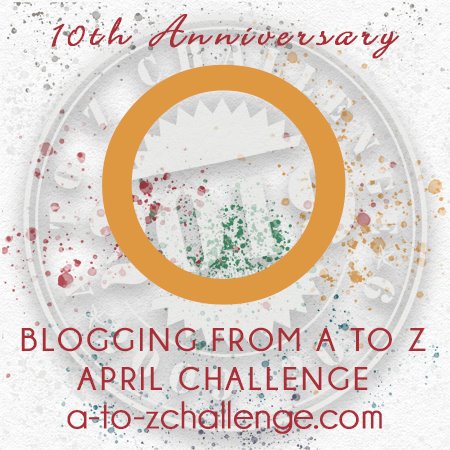
Welcome to a special A to Z Challenge edition of Sciency Words! Sciency Words is an ongoing series here on Planet Pailly about the definitions and etymologies of science or science-related terms. In today’s post, O is for:
OXYGEN CATASTROPHE
Oxygen. What could be more healthy or more wholesome to life than oxygen? But oxygen is, in fact, one of the most dangerous and deadly chemicals on Earth. It is, as you might easily guess, a powerful oxidizer, and it reacts with just about everything—especially organic matter!
True, life on Earth as we currently know it would not be possible without oxygen, but left to its own devices oxygen would eagerly burn us all up.

It started with cyanobacteria (also known as blue-green algae). Cyanobacteria were the first organisms on this planet to develop photosynthesis, a process that uses sunlight to convert water and carbon dioxide into biomolecules. But photosynthesis also produces hazardous oxygen as a waste product.
Things were okay for Earth’s biosphere for a while, but eventually the oxygen situation turned deadly. As David Grinspoon explains in his book Earth in Human Hands:
For hundreds of millions of years, the cyanobacteria kept spitting out oxygen, but all the excess was hungrily snapped up by the abundant iron in Earth’s crust and interior. Yet eventually, around 2.4 billion years ago, the crust was thoroughly oxidized and there was no more available iron lying around.
Grinspoon goes on to explain how life would eventually learn to protect itself from the harmful effects of oxygen exposure and even learn to control oxygen, transforming what was (and still is, in some respects) a deadly poison into a valuable and powerful new fuel.
Before we evolved that ability, however, the buildup of corrosive oxygen in the atmosphere was massively fatal for most of the species that existed on Earth at the time.
This event, approximately 2.4 billion years ago, is generally known as the Great Oxidation Event, but it’s also sometimes called the Oxygen Catastrophe. I prefer calling it the Oxygen Catastrophe, because the consequences were truly catastrophic for almost everyone who was not a cyanobacteria. This was, in fact, Earth’s first mass extinction event.
As we continue our search for alien life, I think it’s important to keep oxygen’s true nature in mind. To us, oxygen means life, but it could just as easily be seen as a deadly poison. There may be other worlds out there with “poisonous” atmospheres, and those worlds may turn out to be the ones we should pay the most attention to.
Next time on Sciency Words A to Z, what if life on Earth started somewhere else?
One of the things that I think is often overlooked when discussing the future of robotics, is how difficult it is to power them. Many of the robots we see in videos doing amazing things have a fuel line tethering them to a gas tank somewhere, and are noisy contraptions due to the fuel combustion.
Life’s use of oxygen is something roboticists and other machine designers may need to look into. It wouldn’t help with robotic spacecraft, but for anything that needs to work in the atmosphere, it could provide a much needed energy source.
LikeLiked by 3 people
But a lot of machines already do use the oxygen that’s in the air. Combustion engines take oxygen from the air and combine it with a reducing agent, like gasoline.
LikeLiked by 2 people
(facepalm)
Good point. Although maybe what they need to be looking it is how respiration works as efficiently as it does.
LikeLiked by 1 person
As I recall, I made a similar oversight in a post years and years back, and you were the one who pointed it out. I was and still am very grateful for that. It was an important lesson when I was just starting to study chemistry. It had never occurred to me before that this was why spacecraft don’t have gas engines.
LikeLiked by 2 people
I love hw counter intuitive this is to us O2 breathers today. Animals! the dung-beetles of cyanobacteria waste. Hmm… oversimplfied, but every bumper sticker slogan is.
LikeLiked by 2 people
That’s true! In many ways, cyanobacteria are the most successful organisms on this planet. The rest of us are just cleaning up after them.
LikeLiked by 1 person
Happy oxygen > Angry oxygen!
DB McNicol, author
A to Z Microfiction: Onion
LikeLiked by 1 person
Oxygen, the poison. This makes me reevaluate a lot of what I’ve learned.
LikeLiked by 1 person
When I started learning all this science stuff, I had to reevaluate pretty much everything I thought I knew. Most of what I remembered from school was not completely false, but I think science is often presented in a simplified way. Oxygen is necessary for life—that’s true, at least for our kind of life, but there’s more to oxygen’s story than that.
LikeLiked by 1 person